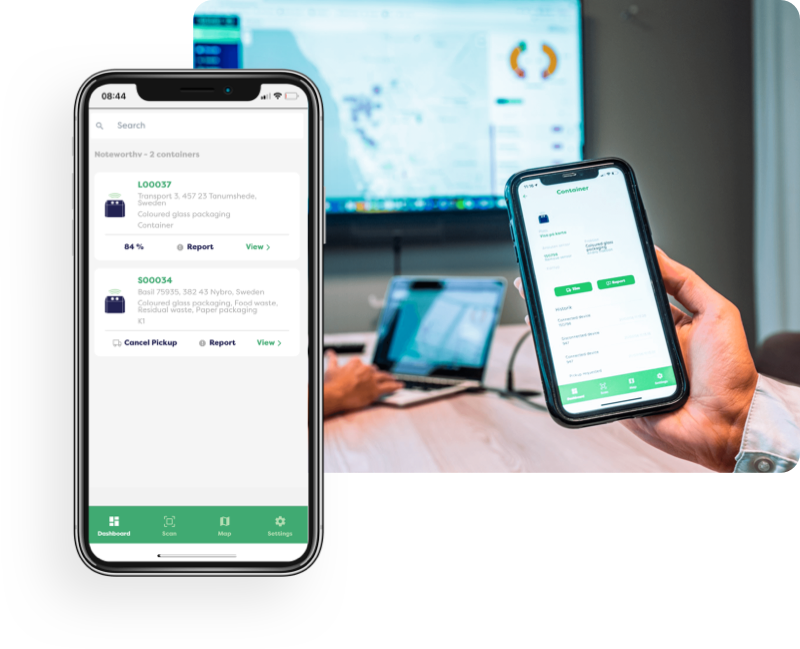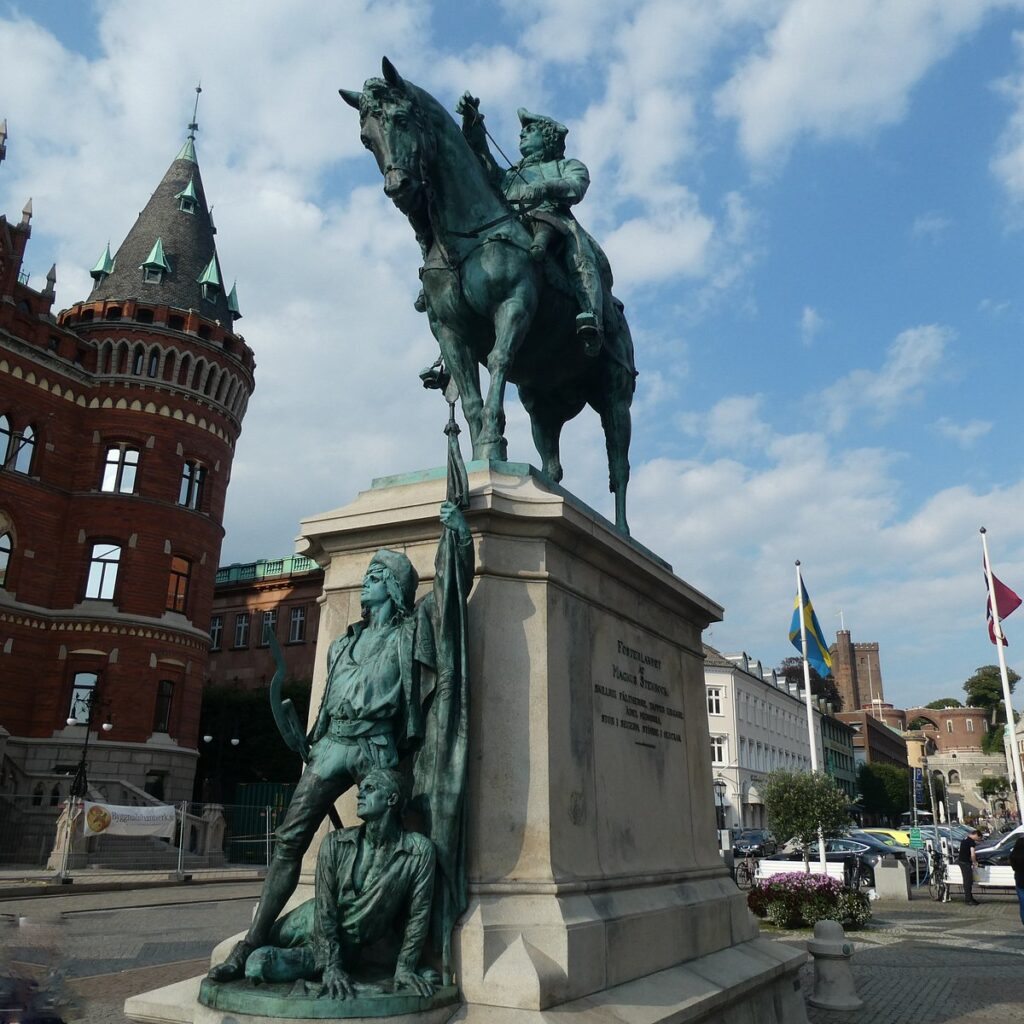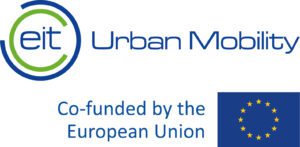"Some other municipalities in Denmark have launched similar projects. But with the good experience from Sweden, I have chosen to use Bintel's holistic methodology/concept, where the data basis is thoroughly assessed before deciding whether to initiate behavioral change initiatives for citizens."
says Mehran Vahman, Project Manager at Vestforbrænding.
Loosely translated, they are a fan of Bintel's structured methodology and use of data to reduce residual waste and increase sorting. You simply want to be part of the culture Bintel has created around the practical use of data in the waste industry.
Digital initiative together with Vestforbrænding
Magnus Stenbock, on horseback in Helsingborg, with his sword halfway out of its sheath. Looking out over Öresund, with his eyes fixed on Denmark and his forehead in deep creases. One wonders, of course, what the man is thinking.
We at Bintel are pretty sure that he was thinking about waste sorting and how to achieve synergies between the two countries' knowledge in this area. 300 years later, Bintel came along and we could replace Magnus on the horse with Jennie, Bintel's CEO, who is now setting her sights on Denmark with the team.
Bintel's largest environmental space project in Denmark is run together with Vestforbrænding, Denmark's largest waste management company, owned by 19 Danish municipalities. As the name suggests, the company, like many Swedish waste management companies, has focused on incineration, but is undergoing a transformation towards increased circularity. Therefore, the collaboration with Bintel was started.
6 different housing companies are also connected to the project, with the hope of being able to get tools to achieve new tighter cost and environmental goals.
Mehran Vahman, Project Manager at Vestforbrænding describes the work as follows:
"Some other municipalities in Denmark have launched similar projects. But with the good experience from Sweden, I have chosen to use Bintel's holistic methodology/concept, where the data basis is thoroughly assessed before deciding whether to initiate behavioral change initiatives for citizens."
Loosely translated, they are a fan of Bintel's structured methodology and use of data to reduce residual waste and increase sorting. You simply want to be part of the culture Bintel has created around the practical use of data in the waste industry.
The aim of the pilot project was to investigate whether data collection can form the basis of a new tool that provides both savings and increased recycling.
Lessons between our countries will be shared during the project, and some things can already be noted in the first phases.
The initial phases have already provided several insights, which we at Bintel are happy to share. If we have to choose 3, they are as follows:
Residual waste subscriptions
It's a bit like handball when you look at the number of challenges faced by waste management and housing companies in reducing residual waste. It is worth noting that the challenges seem to be similar in nature, regardless of which side of the strait you are on. Bintel Insights™ indicates that direct savings by reducing residual waste subscriptions can be made in 50% of the Danish environmental rooms in the project.
Rule of thumb #1 from our corresponding Swedish projects: Direct savings can be made from 40% of our recycling room, without affecting the residents.
Dimensioning guidelines
In Sweden, we see enormous differences in residual waste volumes from our various recycling room, with figures ranging from 25 liters to often over 100 liters per apartment and week. The guidelines given by the Swedish industry organization Swedish Waste Management Association for the dimensioning of waste stations are currently 40-50 L/apartment. Sometimes it is too high, sometimes it is too low, but can be seen as a good average value.
Interestingly, our Danish friends, in the pilot municipality of Glostrup, give the guidelines 90L/lgh,v. This means they are designing for 100% more residual waste per apartment than our Swedish guidelines suggest. We at Bintel find this remarkable.
Rule of thumb #2 from our Swedish projects: If you ask for residual waste, you will get residual waste.
This major difference in dimensioning may be part of the explanation for why we see more empty Danish residual waste containers. If these guidelines are similar at the national level, then the industry has an important structural work ahead, as data indicates that this also affects the amount of residual waste in the containers.
Structural constraints in sorting
In our Swedish partnerships, we typically see that sorting is primarily limited structurally. There is simply no room to handle the recyclable materials that residents want to dispose of. Bintel's solution shows clear links between this and increased residual waste volumes.
The housing companies also testify to increased littering and decreased satisfaction with overcrowded containers, bad ingredients if you want to serve your board reduced waste costs and good climate figures at the end of the year.
The fractions of plastic and paper packaging, which in this Danish municipality are collected in the same container and re-sorted, are often highly prioritized because they represent a large volume and a large climate footprint. What does the structural situation look like then, how many collection points have full containers and cannot collect more plastic and paper, no matter how much you nag the residents?
The project shows that the sorting of plastic and paper packaging is limited at 33% of the collection points.
Rule of thumb #3 from our Swedish partnerships: In 50% of our recycling room , the sorting of plastic and paper packaging is limited by actual space in the containers. So even here we seem to be relatively similar to each other.
Results from the first steps of the Bintel process
Vestforbrænding'sgoal is to increase its sorting by 25% during the current period of its waste plan. In the first phase, we have used simple means to reduce residual waste by 14% and increase the sorting rate by 15% . A bit on the way, already in these first steps in the process!
With these results, Vestfor has decided to take the next step and make a major expansion, where Vestfor takes the project to a typical next level in Bintel's customer journey: a total of about 500 containers.
We on the other side of the strait are ready, both Magnus and Bintel are just missing, and are ready to help Vestfor towards that 25% increase in sorting rate.
Bintel Insights™ is the center for digital insight-driven innovation. waste management

We want to streamline waste management thereby increasing circularity and improving resource utilisation.

